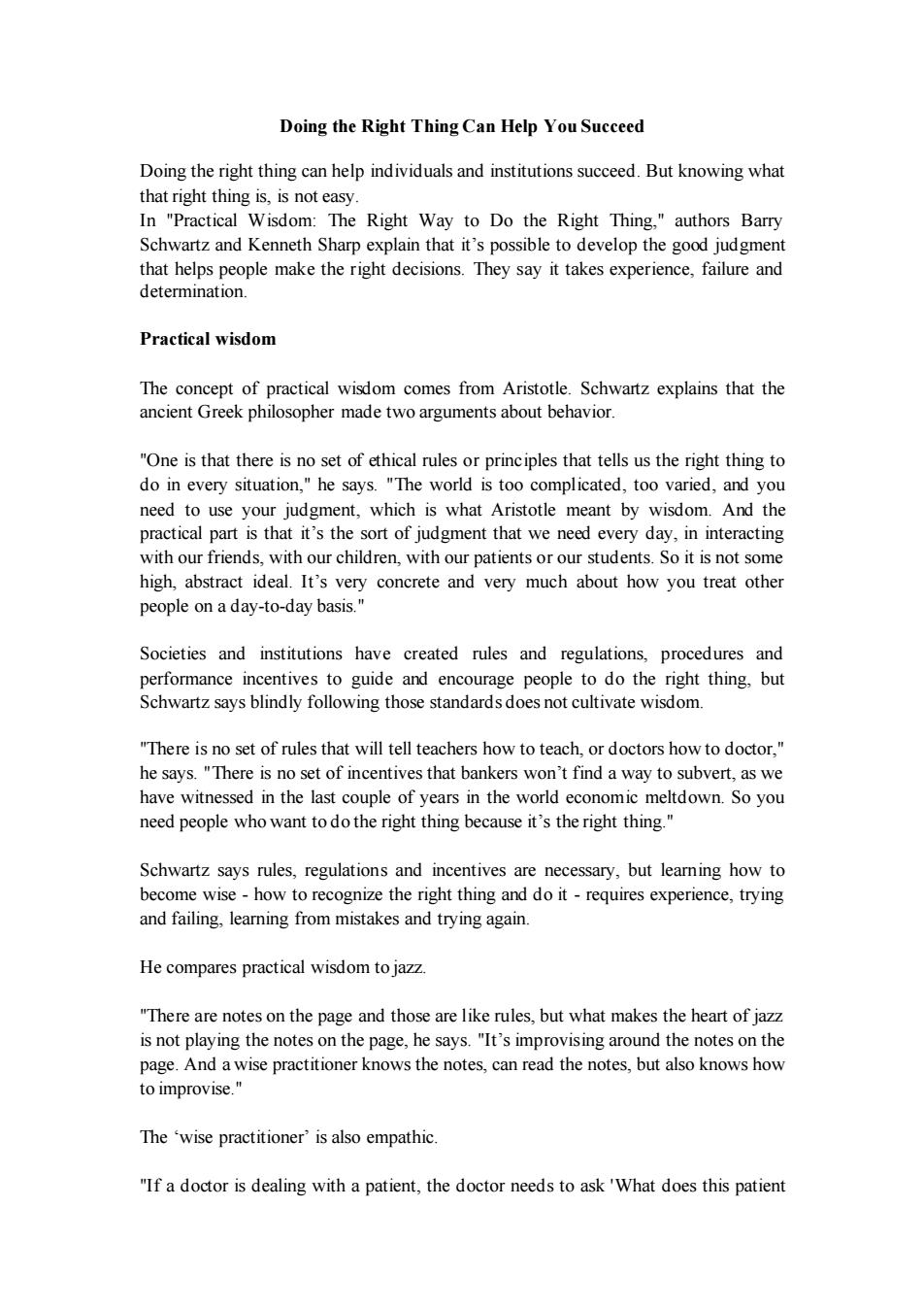
Doing the Right Thing Can Help You Succeed Doing the right thing can help individuals and institutions succeed.But knowing what that right thing is,is not easy. In "Practical Wisdom:The Right Way to Do the Right Thing,"authors Barry Schwartz and Kenneth Sharp explain that it's possible to develop the good judgment that helps people make the right decisions.They say it takes experience,failure and determination Practical wisdom The concept of practical wisdom comes from Aristotle.Schwartz explains that the ancient Greek philosopher made two arguments about behavior. "One is that there is no set of ethical rules or principles that tells us the right thing to do in every situation,"he says."The world is too complicated,too varied,and you need to use your judgment,which is what Aristotle meant by wisdom.And the practical part is that it's the sort of judgment that we need every day,in interacting with our friends,with our children,with our patients or our students.So it is not some high,abstract ideal.It's very concrete and very much about how you treat other people on a day-to-day basis." Societies and institutions have created rules and regulations,procedures and performance incentives to guide and encourage people to do the right thing,but Schwartz says blindly following those standards does not cultivate wisdom. "There is no set of rules that will tell teachers how to teach,or doctors how to doctor," he says."There is no set of incentives that bankers won't find a way to subvert,as we have witnessed in the last couple of years in the world economic meltdown.So you need people who want to do the right thing because it's the right thing." Schwartz says rules,regulations and incentives are necessary,but learning how to become wise-how to recognize the right thing and do it-requires experience,trying and failing,learning from mistakes and trying again. He compares practical wisdom to jazz. "There are notes on the page and those are like rules,but what makes the heart of jazz is not playing the notes on the page,he says."It's improvising around the notes on the page.And a wise practitioner knows the notes,can read the notes,but also knows how to improvise." The 'wise practitioner'is also empathic. "If a doctor is dealing with a patient,the doctor needs to ask'What does this patient
Doing the Right Thing Can Help You Succeed Doing the right thing can help individuals and institutions succeed. But knowing what that right thing is, is not easy. In "Practical Wisdom: The Right Way to Do the Right Thing," authors Barry Schwartz and Kenneth Sharp explain that it’s possible to develop the good judgment that helps people make the right decisions. They say it takes experience, failure and determination. Practical wisdom The concept of practical wisdom comes from Aristotle. Schwartz explains that the ancient Greek philosopher made two arguments about behavior. "One is that there is no set of ethical rules or principles that tells us the right thing to do in every situation," he says. "The world is too complicated, too varied, and you need to use your judgment, which is what Aristotle meant by wisdom. And the practical part is that it’s the sort of judgment that we need every day, in interacting with our friends, with our children, with our patients or our students. So it is not some high, abstract ideal. It’s very concrete and very much about how you treat other people on a day-to-day basis." Societies and institutions have created rules and regulations, procedures and performance incentives to guide and encourage people to do the right thing, but Schwartz says blindly following those standards does not cultivate wisdom. "There is no set of rules that will tell teachers how to teach, or doctors how to doctor," he says. "There is no set of incentives that bankers won’t find a way to subvert, as we have witnessed in the last couple of years in the world economic meltdown. So you need people who want to do the right thing because it’s the right thing." Schwartz says rules, regulations and incentives are necessary, but learning how to become wise - how to recognize the right thing and do it - requires experience, trying and failing, learning from mistakes and trying again. He compares practical wisdom to jazz. "There are notes on the page and those are like rules, but what makes the heart of jazz is not playing the notes on the page, he says. "It’s improvising around the notes on the page. And a wise practitioner knows the notes, can read the notes, but also knows how to improvise." The ‘wise practitioner’ is also empathic. "If a doctor is dealing with a patient, the doctor needs to ask 'What does this patient
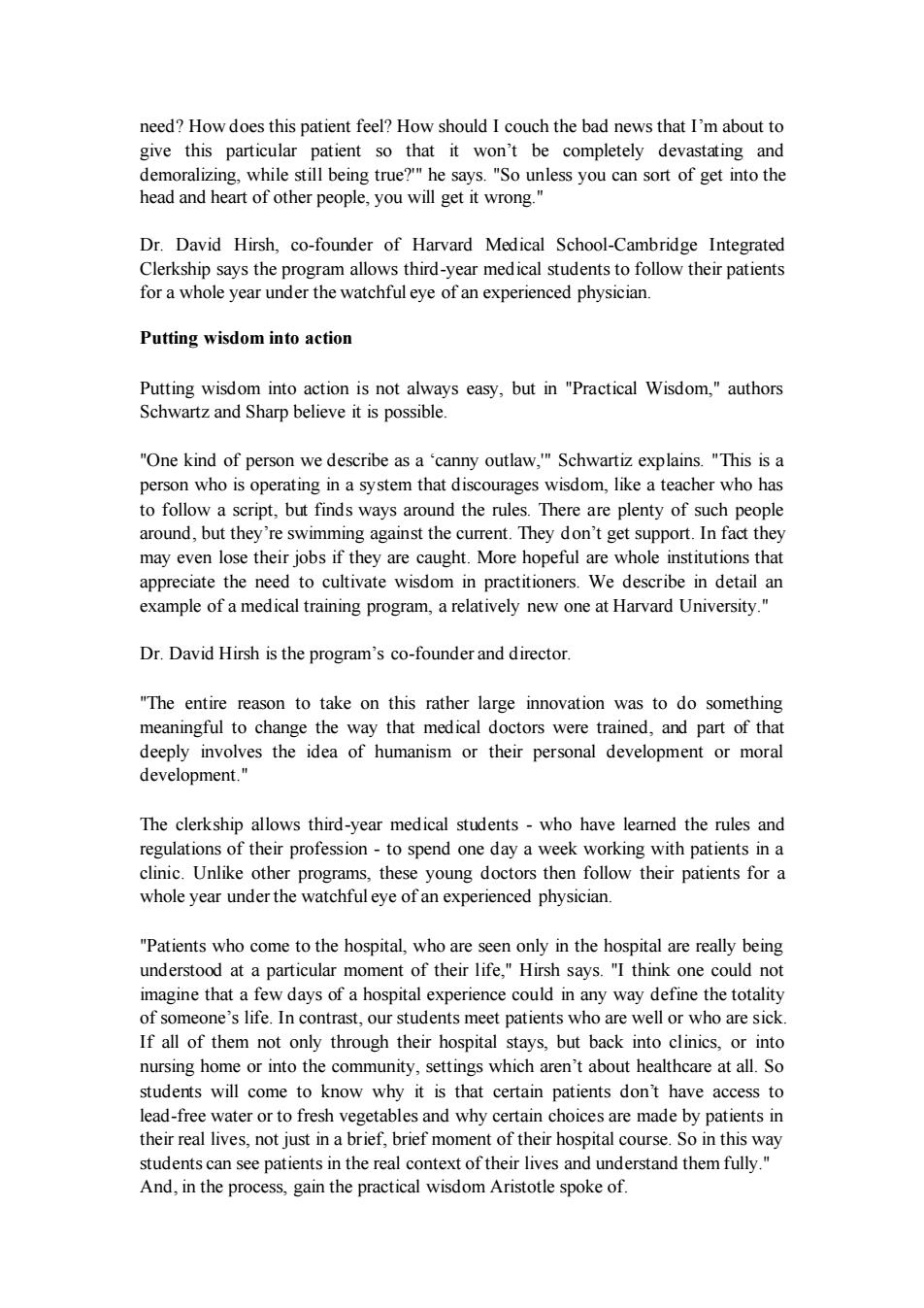
need?How does this patient feel?How should I couch the bad news that I'm about to give this particular patient so that it won't be completely devastating and demoralizing,while still being true?""he says."So unless you can sort of get into the head and heart of other people,you will get it wrong." Dr.David Hirsh,co-founder of Harvard Medical School-Cambridge Integrated Clerkship says the program allows third-year medical students to follow their patients for a whole year under the watchful eye of an experienced physician. Putting wisdom into action Putting wisdom into action is not always easy,but in "Practical Wisdom,"authors Schwartz and Sharp believe it is possible. "One kind of person we describe as a 'canny outlaw,""Schwartiz explains."This is a person who is operating in a system that discourages wisdom,like a teacher who has to follow a script,but finds ways around the rules.There are plenty of such people around,but they're swimming against the current.They don't get support.In fact they may even lose their jobs if they are caught.More hopeful are whole institutions that appreciate the need to cultivate wisdom in practitioners.We describe in detail an example of a medical training program,a relatively new one at Harvard University." Dr.David Hirsh is the program's co-founder and director. "The entire reason to take on this rather large innovation was to do something meaningful to change the way that medical doctors were trained,and part of that deeply involves the idea of humanism or their personal development or moral development." The clerkship allows third-year medical students who have learned the rules and regulations of their profession-to spend one day a week working with patients in a clinic.Unlike other programs,these young doctors then follow their patients for a whole year under the watchful eye of an experienced physician. "Patients who come to the hospital,who are seen only in the hospital are really being understood at a particular moment of their life,"Hirsh says."I think one could not imagine that a few days of a hospital experience could in any way define the totality of someone's life.In contrast,our students meet patients who are well or who are sick. If all of them not only through their hospital stays,but back into clinics,or into nursing home or into the community,settings which aren't about healthcare at all.So students will come to know why it is that certain patients don't have access to lead-free water or to fresh vegetables and why certain choices are made by patients in their real lives,not just in a brief,brief moment of their hospital course.So in this way students can see patients in the real context of their lives and understand them fully." And,in the process,gain the practical wisdom Aristotle spoke of
need? How does this patient feel? How should I couch the bad news that I’m about to give this particular patient so that it won’t be completely devastating and demoralizing, while still being true?'" he says. "So unless you can sort of get into the head and heart of other people, you will get it wrong." Dr. David Hirsh, co-founder of Harvard Medical School-Cambridge Integrated Clerkship says the program allows third-year medical students to follow their patients for a whole year under the watchful eye of an experienced physician. Putting wisdom into action Putting wisdom into action is not always easy, but in "Practical Wisdom," authors Schwartz and Sharp believe it is possible. "One kind of person we describe as a ‘canny outlaw,'" Schwartiz explains. "This is a person who is operating in a system that discourages wisdom, like a teacher who has to follow a script, but finds ways around the rules. There are plenty of such people around, but they’re swimming against the current. They don’t get support. In fact they may even lose their jobs if they are caught. More hopeful are whole institutions that appreciate the need to cultivate wisdom in practitioners. We describe in detail an example of a medical training program, a relatively new one at Harvard University." Dr. David Hirsh is the program’s co-founder and director. "The entire reason to take on this rather large innovation was to do something meaningful to change the way that medical doctors were trained, and part of that deeply involves the idea of humanism or their personal development or moral development." The clerkship allows third-year medical students - who have learned the rules and regulations of their profession - to spend one day a week working with patients in a clinic. Unlike other programs, these young doctors then follow their patients for a whole year under the watchful eye of an experienced physician. "Patients who come to the hospital, who are seen only in the hospital are really being understood at a particular moment of their life," Hirsh says. "I think one could not imagine that a few days of a hospital experience could in any way define the totality of someone’s life. In contrast, our students meet patients who are well or who are sick. If all of them not only through their hospital stays, but back into clinics, or into nursing home or into the community, settings which aren’t about healthcare at all. So students will come to know why it is that certain patients don’t have access to lead-free water or to fresh vegetables and why certain choices are made by patients in their real lives, not just in a brief, brief moment of their hospital course. So in this way students can see patients in the real context of their lives and understand them fully." And, in the process, gain the practical wisdom Aristotle spoke of
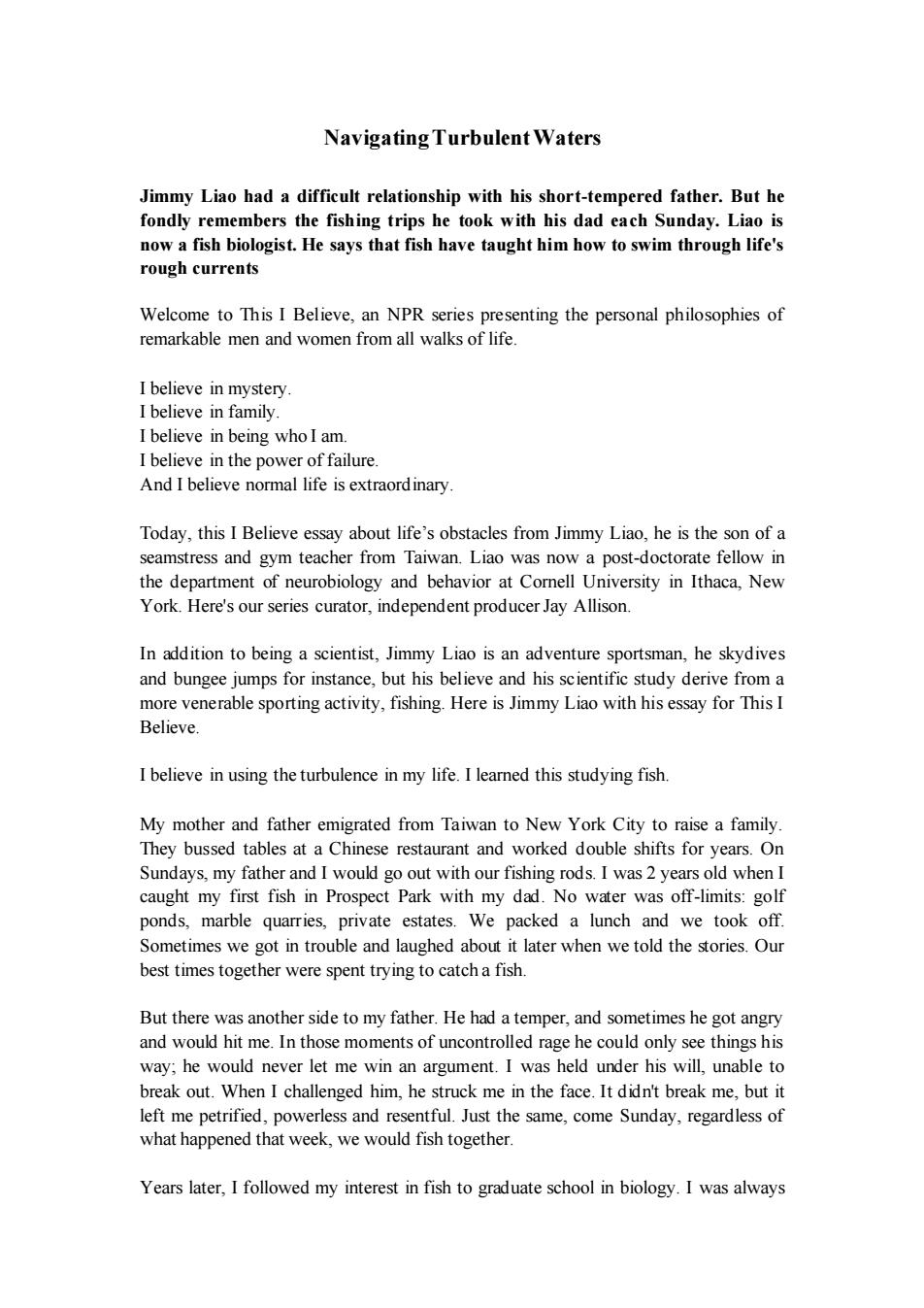
Navigating Turbulent Waters Jimmy Liao had a difficult relationship with his short-tempered father.But he fondly remembers the fishing trips he took with his dad each Sunday.Liao is now a fish biologist.He says that fish have taught him how to swim through life's rough currents Welcome to This I Believe,an NPR series presenting the personal philosophies of remarkable men and women from all walks of life. I believe in mystery I believe in family I believe in being who I am. I believe in the power of failure. And I believe normal life is extraordinary. Today,this I Believe essay about life's obstacles from Jimmy Liao,he is the son of a seamstress and gym teacher from Taiwan.Liao was now a post-doctorate fellow in the department of neurobiology and behavior at Cornell University in Ithaca,New York.Here's our series curator,independent producer Jay Allison. In addition to being a scientist,Jimmy Liao is an adventure sportsman,he skydives and bungee jumps for instance,but his believe and his scientific study derive from a more venerable sporting activity,fishing.Here is Jimmy Liao with his essay for This I Believe. I believe in using the turbulence in my life.I learned this studying fish. My mother and father emigrated from Taiwan to New York City to raise a family. They bussed tables at a Chinese restaurant and worked double shifts for years.On Sundays,my father and I would go out with our fishing rods.I was 2 years old when I caught my first fish in Prospect Park with my dad.No water was off-limits:golf ponds,marble quarries,private estates.We packed a lunch and we took off. Sometimes we got in trouble and laughed about it later when we told the stories.Our best times together were spent trying to catch a fish. But there was another side to my father.He had a temper,and sometimes he got angry and would hit me.In those moments of uncontrolled rage he could only see things his way;he would never let me win an argument.I was held under his will,unable to break out.When I challenged him,he struck me in the face.It didn't break me,but it left me petrified,powerless and resentful.Just the same,come Sunday,regardless of what happened that week,we would fish together. Years later,I followed my interest in fish to graduate school in biology.I was always
Navigating Turbulent Waters Jimmy Liao had a difficult relationship with his short-tempered father. But he fondly remembers the fishing trips he took with his dad each Sunday. Liao is now a fish biologist. He says that fish have taught him how to swim through life's rough currents Welcome to This I Believe, an NPR series presenting the personal philosophies of remarkable men and women from all walks of life. I believe in mystery. I believe in family. I believe in being who I am. I believe in the power of failure. And I believe normal life is extraordinary. Today, this I Believe essay about life’s obstacles from Jimmy Liao, he is the son of a seamstress and gym teacher from Taiwan. Liao was now a post-doctorate fellow in the department of neurobiology and behavior at Cornell University in Ithaca, New York. Here's our series curator, independent producer Jay Allison. In addition to being a scientist, Jimmy Liao is an adventure sportsman, he skydives and bungee jumps for instance, but his believe and his scientific study derive from a more venerable sporting activity, fishing. Here is Jimmy Liao with his essay for This I Believe. I believe in using the turbulence in my life. I learned this studying fish. My mother and father emigrated from Taiwan to New York City to raise a family. They bussed tables at a Chinese restaurant and worked double shifts for years. On Sundays, my father and I would go out with our fishing rods. I was 2 years old when I caught my first fish in Prospect Park with my dad. No water was off-limits: golf ponds, marble quarries, private estates. We packed a lunch and we took off. Sometimes we got in trouble and laughed about it later when we told the stories. Our best times together were spent trying to catch a fish. But there was another side to my father. He had a temper, and sometimes he got angry and would hit me. In those moments of uncontrolled rage he could only see things his way; he would never let me win an argument. I was held under his will, unable to break out. When I challenged him, he struck me in the face. It didn't break me, but it left me petrified, powerless and resentful. Just the same, come Sunday, regardless of what happened that week, we would fish together. Years later, I followed my interest in fish to graduate school in biology. I was always
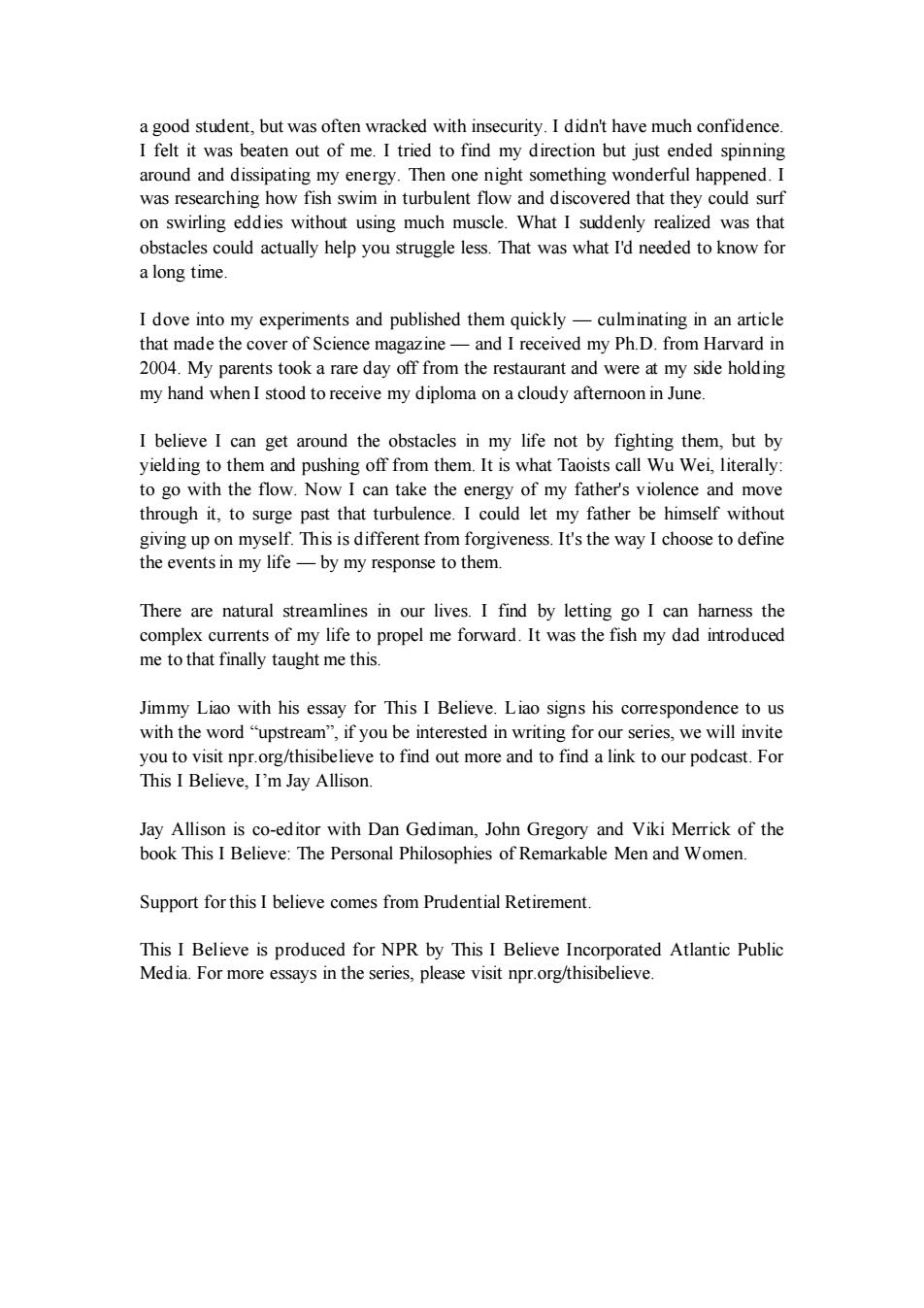
a good student,but was often wracked with insecurity.I didn't have much confidence. I felt it was beaten out of me.I tried to find my direction but just ended spinning around and dissipating my energy.Then one night something wonderful happened.I was researching how fish swim in turbulent flow and discovered that they could surf on swirling eddies without using much muscle.What I suddenly realized was that obstacles could actually help you struggle less.That was what I'd needed to know for a long time. I dove into my experiments and published them quickly-culminating in an article that made the cover of Science magazine-and I received my Ph.D.from Harvard in 2004.My parents took a rare day off from the restaurant and were at my side holding my hand when I stood to receive my diploma on a cloudy afternoon in June. I believe I can get around the obstacles in my life not by fighting them,but by yielding to them and pushing off from them.It is what Taoists call Wu Wei,literally: to go with the flow.Now I can take the energy of my father's violence and move through it,to surge past that turbulence.I could let my father be himself without giving up on myself.This is different from forgiveness.It's the way I choose to define the events in my life-by my response to them. There are natural streamlines in our lives.I find by letting go I can harness the complex currents of my life to propel me forward.It was the fish my dad introduced me to that finally taught me this. Jimmy Liao with his essay for This I Believe.Liao signs his correspondence to us with the word"upstream",if you be interested in writing for our series,we will invite you to visit npr.org/thisibelieve to find out more and to find a link to our podcast.For This I Believe,I'm Jay Allison. Jay Allison is co-editor with Dan Gediman,John Gregory and Viki Merrick of the book This I Believe:The Personal Philosophies of Remarkable Men and Women Support for this I believe comes from Prudential Retirement. This I Believe is produced for NPR by This I Believe Incorporated Atlantic Public Media.For more essays in the series,please visit npr.org/thisibelieve
a good student, but was often wracked with insecurity. I didn't have much confidence. I felt it was beaten out of me. I tried to find my direction but just ended spinning around and dissipating my energy. Then one night something wonderful happened. I was researching how fish swim in turbulent flow and discovered that they could surf on swirling eddies without using much muscle. What I suddenly realized was that obstacles could actually help you struggle less. That was what I'd needed to know for a long time. I dove into my experiments and published them quickly — culminating in an article that made the cover of Science magazine — and I received my Ph.D. from Harvard in 2004. My parents took a rare day off from the restaurant and were at my side holding my hand when I stood to receive my diploma on a cloudy afternoon in June. I believe I can get around the obstacles in my life not by fighting them, but by yielding to them and pushing off from them. It is what Taoists call Wu Wei, literally: to go with the flow. Now I can take the energy of my father's violence and move through it, to surge past that turbulence. I could let my father be himself without giving up on myself. This is different from forgiveness. It's the way I choose to define the events in my life — by my response to them. There are natural streamlines in our lives. I find by letting go I can harness the complex currents of my life to propel me forward. It was the fish my dad introduced me to that finally taught me this. Jimmy Liao with his essay for This I Believe. Liao signs his correspondence to us with the word “upstream”, if you be interested in writing for our series, we will invite you to visit npr.org/thisibelieve to find out more and to find a link to our podcast. For This I Believe, I’m Jay Allison. Jay Allison is co-editor with Dan Gediman, John Gregory and Viki Merrick of the book This I Believe: The Personal Philosophies of Remarkable Men and Women. Support for this I believe comes from Prudential Retirement. This I Believe is produced for NPR by This I Believe Incorporated Atlantic Public Media. For more essays in the series, please visit npr.org/thisibelieve
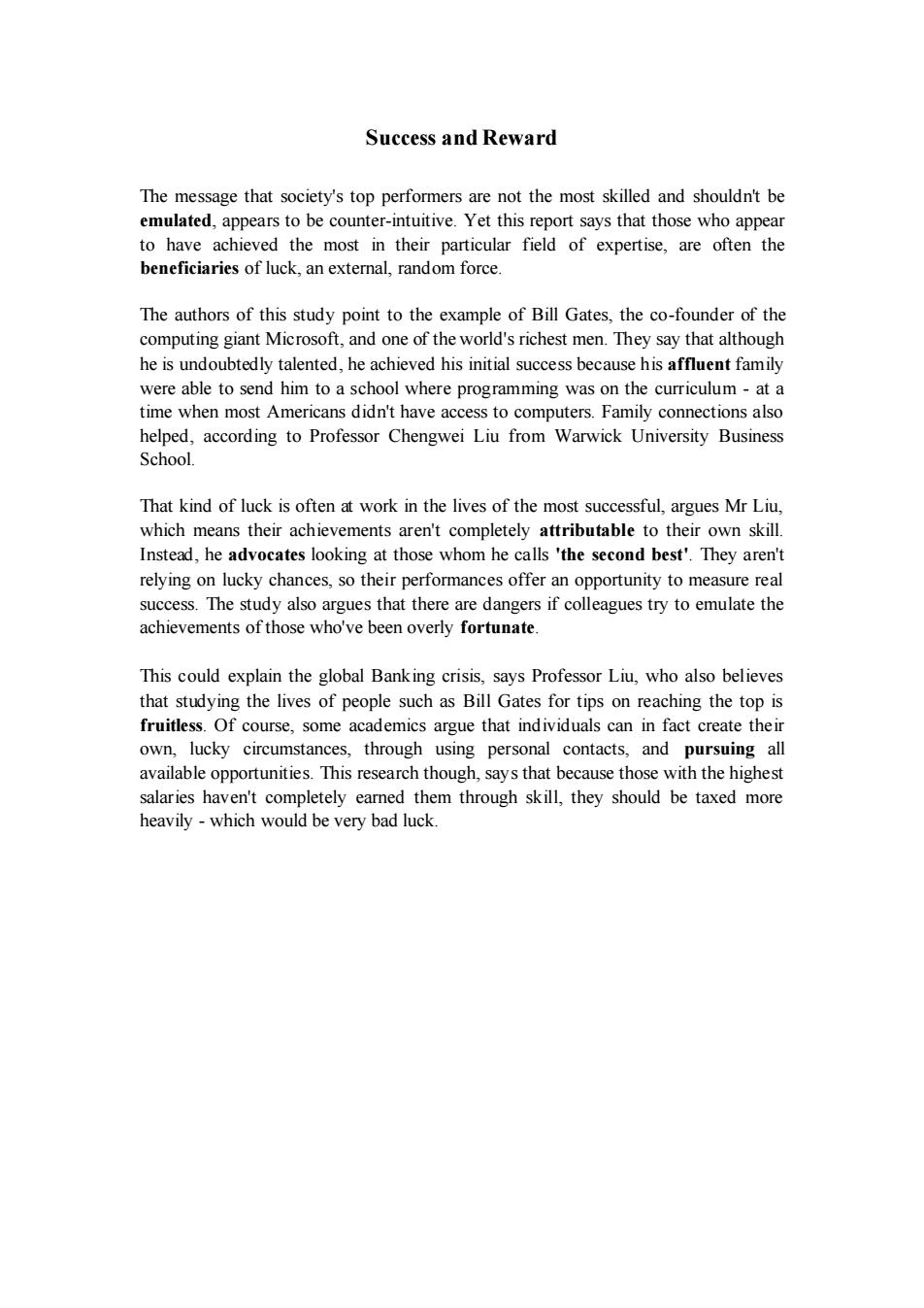
Success and Reward The message that society's top performers are not the most skilled and shouldn't be emulated,appears to be counter-intuitive.Yet this report says that those who appear to have achieved the most in their particular field of expertise,are often the beneficiaries of luck,an external,random force. The authors of this study point to the example of Bill Gates,the co-founder of the computing giant Microsoft,and one of the world's richest men.They say that although he is undoubtedly talented,he achieved his initial success because his affluent family were able to send him to a school where programming was on the curriculum-at a time when most Americans didn't have access to computers.Family connections also helped,according to Professor Chengwei Liu from Warwick University Business School. That kind of luck is often at work in the lives of the most successful,argues Mr Liu, which means their achievements aren't completely attributable to their own skill. Instead,he advocates looking at those whom he calls 'the second best'.They aren't relying on lucky chances,so their performances offer an opportunity to measure real success.The study also argues that there are dangers if colleagues try to emulate the achievements of those who've been overly fortunate. This could explain the global Banking crisis,says Professor Liu,who also believes that studying the lives of people such as Bill Gates for tips on reaching the top is fruitless.Of course,some academics argue that individuals can in fact create their own,lucky circumstances,through using personal contacts,and pursuing all available opportunities.This research though,says that because those with the highest salaries haven't completely earned them through skill,they should be taxed more heavily-which would be very bad luck
Success and Reward The message that society's top performers are not the most skilled and shouldn't be emulated, appears to be counter-intuitive. Yet this report says that those who appear to have achieved the most in their particular field of expertise, are often the beneficiaries of luck, an external, random force. The authors of this study point to the example of Bill Gates, the co-founder of the computing giant Microsoft, and one of the world's richest men. They say that although he is undoubtedly talented, he achieved his initial success because his affluent family were able to send him to a school where programming was on the curriculum - at a time when most Americans didn't have access to computers. Family connections also helped, according to Professor Chengwei Liu from Warwick University Business School. That kind of luck is often at work in the lives of the most successful, argues Mr Liu, which means their achievements aren't completely attributable to their own skill. Instead, he advocates looking at those whom he calls 'the second best'. They aren't relying on lucky chances, so their performances offer an opportunity to measure real success. The study also argues that there are dangers if colleagues try to emulate the achievements of those who've been overly fortunate. This could explain the global Banking crisis, says Professor Liu, who also believes that studying the lives of people such as Bill Gates for tips on reaching the top is fruitless. Of course, some academics argue that individuals can in fact create their own, lucky circumstances, through using personal contacts, and pursuing all available opportunities. This research though, says that because those with the highest salaries haven't completely earned them through skill, they should be taxed more heavily - which would be very bad luck